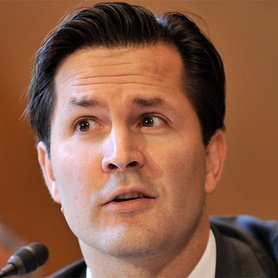Economics
Trade
President Trump’s tariffs on Canada, China, and Mexico could upend U.S. trade. These nine charts show what’s at stake, what comes next, and why it matters.
Feb 5, 2025
President Trump’s tariffs on Canada, China, and Mexico could upend U.S. trade. These nine charts show what’s at stake, what comes next, and why it matters.
Feb 5, 2025
-
U.S. Agricultural Policy OutlookJoseph Glauber, senior research fellow at the International Food Policy Research Institute, discusses the economic impacts of federal policies on U.S. agriculture and international commodity markets.
-
Trade, Tariffs, and Treasuries: The Hidden Cost of Trump’s ProtectionismWhile the Treasury market is likely to remain stable next year, longer-term trade and fiscal trends—such as additional tariffs, questionable foreign demand, as well as rising deficits—risk pushing yields higher
-
Thailand Calls a Snap Election During a Border War: What It All MeansThe border conflict with Cambodia could change electoral politics in Thailand, as voters could rally around the flag and abandon—at least temporarily—some of their support for economic and military reforms.
Experts in this Topic

Bloomberg Chair in Global Health; Senior Fellow for International Economics, Law, and Development; and Director of the Global Health Program
-
Trade CalendarTrade and tariffs are a central part of President Donald Trump’s international economic policy. Stay up to date with the Council on Foreign Relation’s calendar of significant trade-related events.
-
The Global Trading System Faces a Historic ChangeWhile U.S. trade policy has disrupted global trade, it presents an opportunity for the rest of the world to regroup and reform the architecture of the rules-based trade system to meet modern challenges.
-
Trade Tools for Climate Action: Designing Tariffs for DecarbonizationAs the climate crisis deepens, differentiated carbon tariffs offer a way to raise the relative cost of carbon-intensive imports and push global production toward lower-carbon alternatives, particularly in the aluminum and steel industries.
-
A Review of The World’s Worst Bet: How the Globalization Gamble Went Wrong by David J. LynchThe book argues that the United States erred in embracing globalization. But many other policy decisions contributed to America’s current economic predicament—and raising trade barriers may prove as misguided as the mistakes it claims to correct.
-
How Does Immigration Affect the U.S. Economy?Immigrants have long played a critical role in the U.S. economy, filling labor gaps, driving innovation, and exercising consumer spending power. But political debate over their economic contributions has ramped up under the second Trump administration.
-
Trade Tools for Climate Action: Ensuring a Secure and Stable Supply of Critical MineralsAs the world transitions to green energy, the United States’ reliance on China for critical mineral inputs poses significant risk. Though the Trump administration is taking steps to mitigate this vulnerability, the U.S. government should pool international collaboration through legally binding commitments to avoid fragmentation and secure stable access.
-
How I Got My Career in Foreign Policy: Inu ManakInu Manak has explored the intricacies of international trade policy in the world of academia and think tanks. She chatted with CFR about navigating different work environments and the benefits of developing a niche expertise.
-
Free Trade Can’t Bring PeaceFor decades, the liberal belief that open trade fosters peace has shaped US foreign policy. It worked while US security guarantees held the system together, but as those commitments weaken and new powers assert themselves, the multilateral trading order is rapidly coming undone.
-
A Guide to Trump’s Section 232 Tariffs, in MapsPresident Donald Trump has launched a wave of Section 232 tariffs and investigations, seeking to protect U.S. national security. These graphics show the scale and structure of U.S. reliance on foreign suppliers for products ranging from cars to copper.
-
North American Leaders ‘Take a Deep Breath’ Ahead of USMCA ReviewGovernment tensions have upended the economic relationships between the United States, Canada, and Mexico. Despite this, public- and private-sector North American members of the Trilateral Commission appeared committed to finding a path forward.
-
China’s Massive Surplus is Everywhere (Yet The IMF Still Has Trouble Seeing It Clearly)China’s reported current account surplus understates China’s contribution to global trade imbalances. The massive gap between China’s export and import volume growth over the last six years tells a more accurate story.
-
U.S. Tariff and Trade Policy: Takeaways From President Trump’s Trip to AsiaFollowing President Trump’s trip to Asia last week, CFR fellows discuss the outcome of bilateral trade dialogues with the leaders of Malaysia, Japan, and South Korea; takeaways from talks with Chinese President Xi Jinping; and the future of the United States’ economic relationships in the region.











